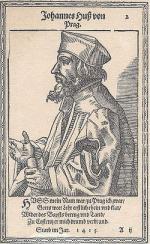Disable ads!
Jan Hus
Jan Hus Jan Hus engraving, 1587 Born 1369 Husinec, Kingdom of Bohemia (now Czech Republic) Died Executed (burned at the stake) 6 July 1415 (aged ca. 45) Konstanz, Bishopric of Constance, Holy Roman Empire (now Germany) Other names John Hus, John Huss or Jan Huss Era Renaissance philosophy Region Western philosophy School Hussite Main interests Theology Influences John Wycliffe Influenced John Wesley, Jerome of Prague, Martin Luther Jan Hus (/hʌs/; Czech: [ˈjan ˈɦus] ( listen); c. 1369 – 6 July 1415), often referred to in English as John Hus or John Huss, was a Czech priest, philosopher, early Christian reformer and Master at Charles University in Prague. After John Wycliffe, the theorist of ecclesiastical Reformation, Hus is considered the first Church reformer, as he lived before Luther, Calvin and Zwingli. Hus was a key predecessor to the Protestant movement of the sixteenth century, and his teachings had a strong influence on the states of Europe, most immediately in the approval of a reformist Bohemian religious denomination, and, more than a century later, on Martin Luther himself. He was burned at the stake for heresy against the doctrines of the Catholic Church, including those on ecclesiology, the Eucharist, and other theological topics. After his death in 1415, the followers of Hus's religious teachings (known as Hussites) rebelled against their Roman Catholic rulers and defeated five consecutive papal crusades between 1420 and 1431 in what became known as the Hussite Wars. A century later, as many as 90% of inhabitants of the Czech lands were non-Catholic and some still follow the teachings of Hus and his successors.
 Read more on wikipedia.org Read more on wikipedia.org
 All quotes by Jan Hus All quotes by Jan Hus
 Edit Edit
|

|
|
|
|
|
Background photo by Giuliana
|